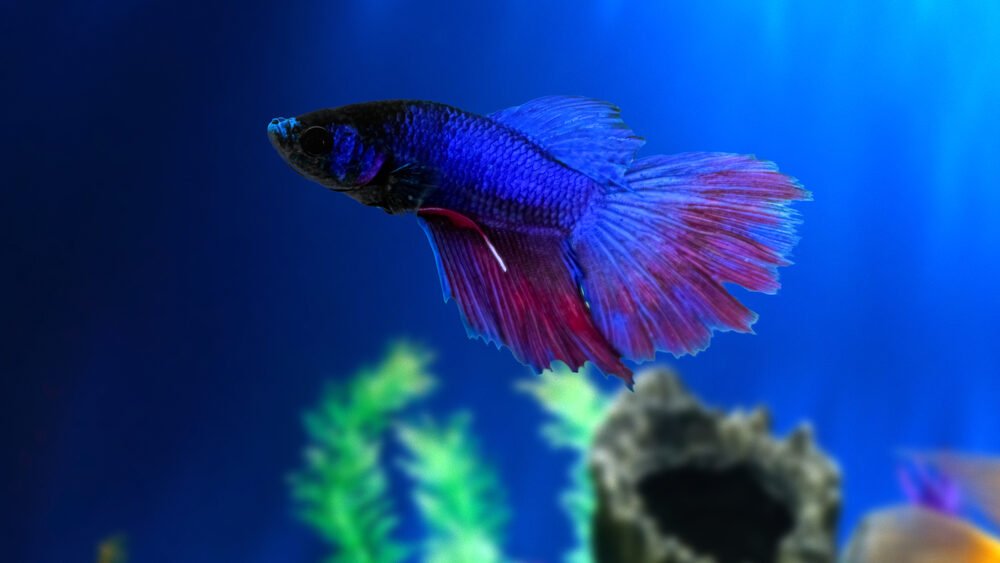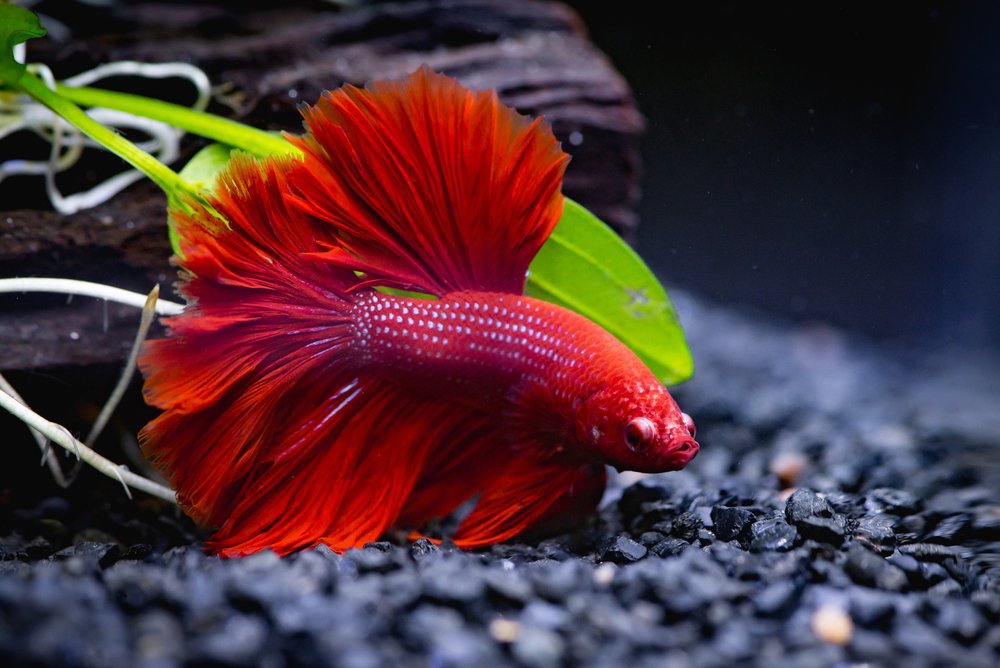10 Possible Reasons Why Your Betta Fish is Laying on the Bottom of the Tank
Betta laying on the bottom of the tank? Don’t panic just yet. Read these 10 reasons first!
This article provides an overview of 10 possible reasons a betta fish may lie on the bottom of the tank. It is essential to understand the cause of this behavior as it could indicate an underlying issue that needs to be addressed for the health and well-being of the betta fish. This article aims to help betta fish owners identify and address any underlying issues causing their betta fish to lie on the bottom of the tank. The possible causes discussed in this article range from environmental factors, such as water quality, temperature, and lighting, to medical conditions, such as parasites or injury. By understanding these potential causes, fish owners can take steps to ensure their betta fish has a long, healthy and happy life.
Reason #1: Illness or Disease
Your betta may be sick and too weak to swim or move around in its tank. Symptoms to watch for include:
- indifference,
- no appetite,
- discolored body or fins.
If your betta fish is exhibiting any of these symptoms, you should seek treatment options as soon as possible to prevent further deterioration. Treatment options can vary depending on what type of illness or disease is affecting your betta fish, but generally involve:
- adding medication to your tank
- and making sure that your water parameters are at optimal levels.
Awareness of these symptoms and treatments makes you a better fish owner.
Reason #2: Stress

Stress can be caused by many things, such as being exposed to sudden changes in temperature, overcrowding, poor water quality, and not having enough hiding places.
To reduce stress in your betta fish, you should ensure that their environment is stable with consistent temperatures and ample hiding places. You also need to ensure that their water is clean and pollutants-free.
Lastly, it’s essential to provide mental stimulation for your betta fish by introducing decorations to their tank. Maybe add a friend by adding a fish that can live with bettas. Doing this will help reduce stress and calm your betta like a Zen monk.
Reason #3: Poor Water Quality
A betta fish lying at the bottom of the tank may be a sign of poor water quality, which may be caused by several factors, such as:
- too high or low pH
- too high or low ammonia levels
- too high or low nitrite levels
- temperature changes
- little oxygen in the water
- dirty tank water.
You can maintain good water quality for your betta fish by testing the tank regularly and adjusting when something is off. Do a water change once weekly and use the right filter for your tank.
Reason #4: Inadequate Diet
All fish need a balanced diet, and many prefer animal-based proteins. These proteins include brine shrimp, blood worms, daphnia, and pellets. Feeding your betta a variety of food is vital to ensure that they receive all the essential vitamins and minerals for optimal health.
If you feed your fish too much or too little, that can lead to problems such as malnutrition or obesity, and you don’t want that. Apart from dieting, the feeding time should be limited to one or two small daily meals for only a few minutes. You can change the types of food you feed to balance their diet. Also, overfeeding can worsen the water quality, which is another reason for a betta fish at the bottom of the aquarium.
Reason #5: Unsuitable Tank Conditions

If your betta has taken up residence on the bottom of the tank lately, your tank conditions may not be suitable for your fish. I mean, seriously, who’d want to live in a cramped, dirty, dark space? Not your betta fish, that’s for sure.
If you were forced to live in a room with no windows, hard wooden furniture, and polluted air, wouldn’t you want to curl up in the fetal position, too? Your fish may feel that your aquarium tank is a solitary confinement prison cell.
But there are a few things you can do to make the tank’s living space more livable:
- Choose the right tank size for your fish. A betta needs at least a 2.5-gallon tank not to feel claustrophobic but 5 gallons or more to thrive. A smaller tank doesn’t make it want to stay there.
- As I mentioned before, water quality is vital, so keep it clean and filtered and change it often
- How are the lighting and decor in the tank? The betta is not a dark deep-sea monster but a cheerful freshwater fish that needs natural light and a bit of vegetation to feel comfortable. Plastic plants and brightly painted rocks may look cool to humans, but your fish wants to live in its natural habitat, so try to make it similar.
A comfortable environment for your fish helps it swim happily around your tank instead of lying depressed on the tank floor.
Reason #6: Old Age
Your betta may be lying down because it’s old. Like humans’ physical and mental abilities decline as they age, fish are the same. Aging can cause many health issues, weaken the immune system, worsening eyesight and make it less active.
You might think, “But wait, fish can’t age like humans, can they?” If a betta fish were a human, it would be a senior citizen. An older person rests all day, is in pain, and doesn’t have the energy to do things they used to enjoy, and your fish seems to act the same way.
Observe the behavior of your fish. Are they less active than before? Do they spend more time locating the food? Does it look like they struggle to swim? These might be warning signs that your betta fish is getting old.
If your fish is aging, care for and support them through their golden years.
Reason #7: Resting or Sleeping
Before you start panicking and gasping for air when you see your betta lying on its side, ask yourself, “is it just resting or sleeping?”. It is usual for fish to rest and sleep to maintain their physical and mental health, and bettas are known to be more active during the day and sleep at night.
“But how do I know if my betta fish is resting or sleeping and not just sick or stressed?” One way to tell is by observing their behavior. If your betta fish is resting or sleeping, it will likely be relatively still and not responding to stimuli in the tank. On the other hand, if sick or stressed, they may be more active and display other visible signs of distress.
If your fish is sleeping, let it rest in a comfortable habitat. Don’t disturb your betta fish when sleeping, as it can disrupt its circadian cycle. Beauty sleep makes for a healthy betta.
Reason #8: Physical Injury

Is your sleeping betta injured? All animals can suffer injuries from a variety of causes. Rough handling, accidents, or fights with other fish are a few causes.
A way to tell if your fish has an injury is to look for visible physical signs, such as cuts, bruises, or swelling, and observe their behavior. Sluggish fish may be in pain.
“But hang on, how can I tell if my betta fish is in pain? They don’t have facial expressions like humans.”
The key here is to see if they change their behavior. If your betta used to be a fast, energetic swimmer but is now lying on the bottom of its tank and begging for someone to put it out of its misery, that could be a sign they’re in pain.
If your fish is in pain or you have the slightest suspicion, please consult an expert for advice or visit a veterinary for care. Don’t wait. Get proper treatment so your fish can recover, return to its usual self, and play with its tank mates.
Reason #9: Presence of Other Fish
Your betta may act strangely when there are other fish in the tank. They are territorial and may become stressed by potential intruders. To determine if this is the issue, observe their interactions and look for signs of aggression, such as chasing or biting. Also, consider the size and type of the other fish, as some species may be more compatible with betta fish than others.
Signs of stress in your betta fish include a lack of appetite and lethargy. If you suspect other fish are causing anxiety, consider separating them or rehoming one or more of the fish. Remember, you must choose a betta’s friends carefully, as they are prone to aggression and territorial behavior towards other fish. By declaring peace in your community tank, you can reduce stress and ensure the health and well-being of all your fish.
Reason #10: Boredom
If your betta fish has been lying on the bottom of the tank more than usual, boredom could be the culprit. Just like humans, fish can get bored if they don’t have enough stimulation in their environment. Imagine if you were stuck in a tiny room with nothing to do or see – you’d probably get bored, too! Well, that’s precisely how your betta fish may feel if they don’t have enough to keep them entertained.
To prevent boredom in your betta fish, providing them with a stimulating environment is crucial. This can include adding plants, decorations, and toys to the tank, as well as providing regular opportunities for play and interaction. You should also vary their diet and offer them different types of food to keep things interesting. “But how do I know if my betta fish is bored?” you might be wondering. One way to tell is by observing their behavior. If your betta fish seems less active or interactive than usual, this could signify that they are bored.
By providing your betta fish with a stimulating environment and plenty of opportunities for play and interaction, you can help prevent boredom.
Frequently Asked Questions about Betta Fish on the Tank Floor
Why is my betta hiding in the bottom of the fish tank?

There can be many reasons: they feel scared, are stressed, have health problems, or experience pain.
Give your fish a habitat free of stress and non-aggressive tank mates.
Why is my betta sleeping at the bottom of the tank?

Bettas sleep a lot, especially at night, and need to rest to maintain their health.
Give your fish a variety of environments in your fish tank, including hiding places and vegetation like water plants, stones, and caves.
A wide variety of areas makes it easier for your fish to find a good place to sleep undisturbed.
Is my betta sick or just sleeping?

If your fish is sleeping, please don’t disturb it. But if it is sick, there are a few warning signs to look out for: they are less active than before, look stressed, don’t want to eat food, or have problems swimming.
If you suspect your fish is sick, consult a veterinarian for advice or medical treatment.
Conclusion: Reasons Why Betta Fish Lay on the Bottom of the Tank
If your experience your betta laying at the bottom of the betta tank more than normal, it is essential to determine the cause so that you can take appropriate action. We’ve covered ten possible reasons for this behavior, ranging from water conditions, water temperature of your tank, water flow, health issues, what food it’s eating, to boredom. By taking the time to observe your betta’s behavior and consider their living environment, you can identify any underlying issues and take steps to address them and keep your betta swimming around happily in the aquarium water.
If you can’t figure it out, try eliminating each possibility one by one. For example, if you’ve ruled out health issues, physical injury, and old age, you can focus on other factors, such as fish tank conditions, diet, and boredom.
By taking a proactive approach and addressing any issues causing your fish laying at the bottom of the tank, you can help ensure their health and well-being and keep them happy and active. So don’t wait – start investigating and act today!

